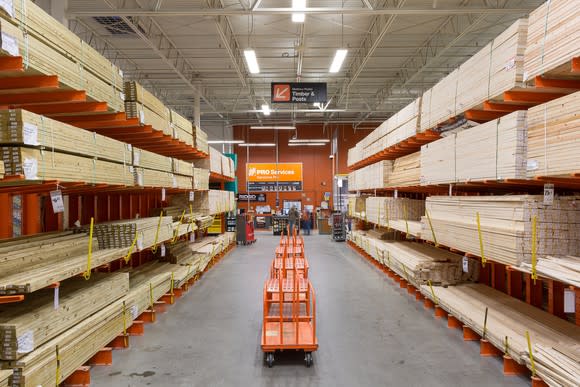Could Home Depot, Inc. Be a Millionaire Maker Stock?
Most investors are saving with a certain financial goal in mind. Maybe you're investing for a kid's college fund or your own retirement, or maybe there's a particular number that you're thinking of that will bring you financial peace. For many, one million dollars represents that standard of wealth -- and while that may not buy you a house in some parts of the country, it's an enviable nest egg to be sitting on.
Home Depot (NYSE: HD) has been a top performer over the last decade. Its stock has gone up over 600% over that time period as the home-improvement retailer has ridden the housing recovery and made smart decisions, like not opening new stores, investing in technology and e-commerce, and returning capital to shareholders through dividends and share buybacks.
There's little doubt of Home Depot's past success, but can it make you a millionaire? Let's take a closer look at what the home improvement giant can offer investors today.

Image source: Home Depot
A clear roadmap
Unlike most companies, Home Depot gives a clear outline of its financial goals for the coming years so investors can know what to expect. Those goals are a testament to the company's methodical decision-making and emphasis on return on investment rather than just growth.
In its most recent forecast at the end of last year, the company said that for fiscal 2020, which ends in early 2021, it expects revenue of $114.7-$119.8 billion, or compound annual revenue growth of 4.5-6% compared to last year. It also sees an operating margin of 14.4-15%, which compares to 14.5% last year, and it expects return on invested capital of 36.4-39.6%, though it raised that range to more than 40% after the new tax law was passed.
Based on those numbers, investors can expect the company to have about $17.2 billion in operating income in fiscal 2020, up from $14.7 billion last year, representing compound annual growth of 5.4%.
Home Depot doesn't give long-term earnings per share guidance, but if we assume the company buys back 50 million shares annually, it continues to pay about $1 billion a year in interest, and it pays a tax rate of 26%, which the company expects for this year due to the tax law, its diluted earnings per share in 2020 should be $11.59. That compares to $7.29 last year, representing total growth of 59%, or about 17% on a compound annual basis.
If the company achieves that growth rate, the stock can be expected to grow by a similar amount, as earnings growth is the most important factor in stock appreciation.
What could come next
Home Depot has been a reliable dividend payer, and in recent years the company has been generous with its dividend hikes. Since 2012, the company has raised its quarterly dividend payout by 16% or more each year, and today pays a dividend of $1.03 a quarter, good for a yield of 2.4%. If it raises its dividend 16% annually over the next three years, that quarterly payout will grow to $1.60.
Beyond the next three years it gets more difficult to forecast Home Depot's fortunes. As a home-improvement retailer, the company is sensitive to the macroeconomic environment, specifically the housing market, and the stock could pull back on a recession or a housing crash.
We know the company's business will continue to revolve around home-improvement products, but it also continues to invest in technology and e-commerce, remaking itself for the changing retail environment. It could also make a major acquisition. In fact, last December Recode reported that the company had held internal discussions about acquiring XPO Logistics, a leader in last-mile delivery of heavy goods like furniture and appliances. A bid for the company, which was worth $9 billion at the time and is now valued at $13.5 billion, never came to fruition, but Home Depot was reportedly interested in part to keep XPO out of the hands of Amazon, pointing to an emerging rivalry with the e-commerce giant.
Finally, Home Depot is already worth $230 billion, more than any other brick-and-mortar retailer except Walmart, meaning upside growth may be limited -- only a handful of companies are worth more than that. As a company gets bigger, it generally becomes harder to maintain high growth rates, as in order to double in value from this point Home Depot would have to add another $230 billion in value, excluding the impact of share buybacks. Its P/E ratio is also fairly elevated at 27.4, meaning any appreciation in the stock is likely to come from earnings growth rather than multiple expansion -- meaning its P/E ratio would be going up without any concomitant earnings growth.
Those two factors may be the biggest obstacles to Home Depot's ability to become a millionaire-maker stock. While I think the company will deliver steady growth and continue to outperform the market over the next few years, there's a ceiling on the upside potential here, as management only sees revenue growth of about 5% and the company is already huge. Still, Home Depot looks like a solid pick for almost any portfolio, especially considering its growing dividend.
While it may not deliver blockbuster returns, it can provide a mix of income and growth that makes it a smart way to diversify your portfolio.
More From The Motley Fool
John Mackey, CEO of Whole Foods Market, an Amazon subsidiary, is a member of The Motley Fool's board of directors. Jeremy Bowman owns shares of XPO Logistics. The Motley Fool owns shares of and recommends Amazon. The Motley Fool has the following options: short September 2018 $180 calls on Home Depot and long January 2020 $110 calls on Home Depot. The Motley Fool recommends Home Depot and XPO Logistics. The Motley Fool has a disclosure policy.

 Yahoo Finance
Yahoo Finance 